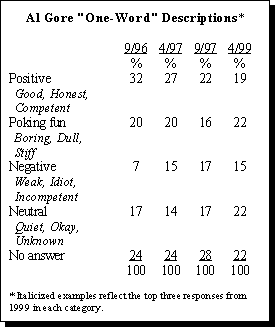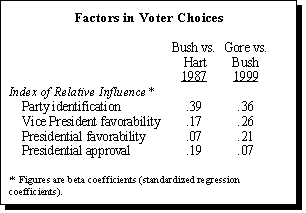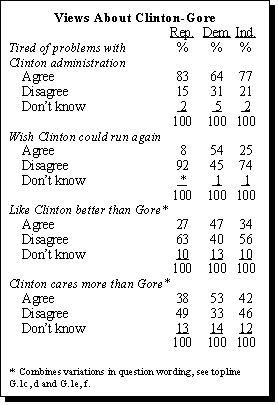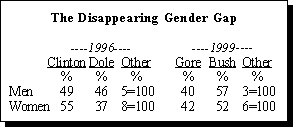Introduction and Summary
Personal image problems and fallout from Clinton administration scandals are contributing to Al Gore’s declining favorability ratings and his poor showing in early horse race polls. As the vice president has inched closer to the Democratic presidential nomination, his favorability ratings have fallen and he has slipped further behind GOP frontrunner George W. Bush in the horse race polls.
While general election polls taken at this point in the cycle are more often wrong than right (see page 5), Gore’s problems may be more enduring. Fewer Americans volunteer positive descriptions of Gore than did so just two years ago, and his favorability ratings are well below the 1987 ratings of Vice President Bush, who trailed the likely Democratic nominee at that time.
 The patterns of response to questions about Gore may be more troublesome than the weak numbers themselves. Analysis of the latest Pew Research Center survey shows that attitudes toward Gore are more closely linked to Bill Clinton’s mixed personal ratings than to his strong job approval. The opposite pattern was observed for Bush and Reagan 12 years ago. The survey also finds that three-quarters of Americans say they are tired of the problems of the current administration — an attitude more closely tied to voter choice than are views of Gore’s likability or his sympathy for the problems of ordinary Americans.
The patterns of response to questions about Gore may be more troublesome than the weak numbers themselves. Analysis of the latest Pew Research Center survey shows that attitudes toward Gore are more closely linked to Bill Clinton’s mixed personal ratings than to his strong job approval. The opposite pattern was observed for Bush and Reagan 12 years ago. The survey also finds that three-quarters of Americans say they are tired of the problems of the current administration — an attitude more closely tied to voter choice than are views of Gore’s likability or his sympathy for the problems of ordinary Americans.
Moreover, Gore’s support among women — especially the Independent women who played an important role in both of Clinton’s victories — is dramatically below Clinton’s in 1996.
These are the principal findings of a March 24-30, 1999 Pew Research Center survey of 1,786 adults.
Gore’s Favorability Dips
For the first time since the September 1997 allegations of wrongdoing in Gore’s fund raising activities, his favorability ratings slipped below 50% this month. Today, 47% of the public holds a favorable opinion of Gore; 43% say their view is unfavorable. This is down significantly from December 1998, when 58% viewed Gore favorably and 33% unfavorably.
The falloff in favorability is especially dramatic among Republican-oriented groups: men, the college-educated and those with incomes over $75,000 a year. This partisan pattern suggests that opinion about Gore is becoming more politicized as he is perceived more as a candidate than a vice president, but Gore is also losing support among Independents and those aged 50-64.
Most Democrats continue to hold favorable opinions of Gore (71%), although Clinton receives higher favorability ratings from his own party members (85%).
 When asked to give their impression of Gore in a single word or phrase, fewer Americans now describe the vice president in positive terms than did so in recent years. In 1996, 32% described Gore positively compared to only 19% today. This month, the top response was “boring.” Nearly a quarter (23%) use other mocking words such as wimp, wooden or stiff. This represents an increase from 1997, when 16% used words that poked fun at the vice president. One-in-five (22%) describe Gore in neutral terms. Relatively few (15%) use more cutting negative words.
When asked to give their impression of Gore in a single word or phrase, fewer Americans now describe the vice president in positive terms than did so in recent years. In 1996, 32% described Gore positively compared to only 19% today. This month, the top response was “boring.” Nearly a quarter (23%) use other mocking words such as wimp, wooden or stiff. This represents an increase from 1997, when 16% used words that poked fun at the vice president. One-in-five (22%) describe Gore in neutral terms. Relatively few (15%) use more cutting negative words.
Gore Lags Despite Clinton Ratings
Gore continues to trail Republican Bush in a hypothetical match-up for the 2000 presidential election. In this poll, the Texas governor leads Gore by 54%-41%, a wider margin than in January, when Bush’s support was 50% and Gore’s 44%. Gore leads only among non-whites, senior citizens and urban dwellers. Bush runs strongest among white men, those making over $50,000, white evangelicals, and Independents.
In a Gore-Bush match-up, Clinton’s mixed favorability ratings are a stronger predictor of support for Gore than is Clinton’s job approval. In the spring of 1987, the relative importance of presidential job approval and favorability ratings differed. In a horse race poll pairing George Bush and Gary Hart, Reagan’s job approval ratings were more of a driving force than personal ratings of Reagan in predicting support for Bush. It is important to note that as Reagan’s approval ratings rebounded somewhat over the course of the 1988 campaign, support for Bush grew.
 While Gore does benefit from Clinton’s robust job approval ratings, he is clearly being hurt by weariness with problems of the Clinton administration. An overwhelming majority (74%) of Americans agree with the statement, “I am tired of all the problems associated with the Clinton administration.” This view is held by 77% of Independents and 64% of Democrats. Among those who express fatigue, 60% say they would vote for Bush over Gore in a two-way 2000 match-up; only 35% pick Gore.1
While Gore does benefit from Clinton’s robust job approval ratings, he is clearly being hurt by weariness with problems of the Clinton administration. An overwhelming majority (74%) of Americans agree with the statement, “I am tired of all the problems associated with the Clinton administration.” This view is held by 77% of Independents and 64% of Democrats. Among those who express fatigue, 60% say they would vote for Bush over Gore in a two-way 2000 match-up; only 35% pick Gore.1
Most Americans like Gore better than Clinton, although the margin is not overwhelming. Half (52%) agree with the statement, “I like Al Gore better as a person than Bill Clinton.” One-third (35%) disagree.
While Americans may like Gore better than Clinton, they don’t see the vice president as more caring. Only 34% of the public agrees with the statement, “Al Gore cares more than Bill Clinton about people like me.” A narrow majority (50%) disagree.
Despite Clinton’s strong 62% job approval rating, few Americans wish he could run for a third term. Only 29% of the public would like to see four more years of Clinton; 69% would not.
Gore and Gender
The gender gap that helped fuel Clinton’s reelection in 1996 is helping Gore only at the margins this year. Women prefer Bush over Gore by a margin of 52%-42%. Men opt for Bush by an even wider 57%-40% margin. In January of 1996, Clinton led Dole among women by nearly 20 percentage points and ran slightly ahead among men.
 Gore has an edge among women in his personal favorability rating. Half (50%) of women rate him favorably, compared to 44% of men. Men are more likely than women to give Gore an unfavorable rating — 49% vs. 38%, respectively. Nonetheless, in the horse race, Gore lags behind Bush among some key groups of women: whites, those aged 50-64, high-income women, and Independents.
Gore has an edge among women in his personal favorability rating. Half (50%) of women rate him favorably, compared to 44% of men. Men are more likely than women to give Gore an unfavorable rating — 49% vs. 38%, respectively. Nonetheless, in the horse race, Gore lags behind Bush among some key groups of women: whites, those aged 50-64, high-income women, and Independents.


